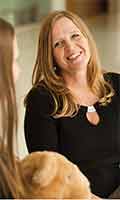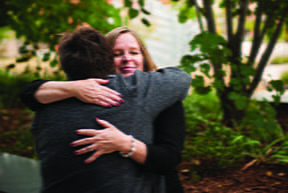After escaping an abusive home, Christina Dalpiaz focused her career on creating safe havens for children.

Christina Dalpiaz.
Photo credit: Theo Stroomer.
Abuse victims might feel like they have no control—and Christina Dalpiaz ’07 understands that. She remembers all too well how she felt the first time a loved one’s hand became a weapon: She believed that her life’s path was set.
Dalpiaz narrowly escaped a life dictated by circumstance. She fled at age 18 from her abusive environment. Addiction and mental health issues were rampant in that small, impoverished town in the Appalachian foothills of Ohio Valley. She was functionally illiterate and knew her future would be limited if she stayed there. Not sure where else to turn, she enlisted in the U.S. Navy. “I'm a coal miner's daughter and granddaughter, and both of my parents had substance abuse problems,” Dalpiaz says. “The military gave me the opportunity to redefine myself.”
At the urging of a bunkmate, Dalpiaz opened an educational account to save for college. Eventually, she went on to earn her associate and bachelor’s degrees in psychology. Dalpiaz rose to the rank of lieutenant commander, almost certainly a success she never could have imagined as a child. And while her 22-year military career was satisfying, she never escaped the memories of her past. She couldn’t stop thinking about the children who couldn’t get away like she did, and adults who didn’t know how to parent without violence. Dalpiaz thought that maybe there was something she could do to help them, to save lives, and to strengthen families and communities.
Since the 1980s, her empathy and compassion for victims of family violence have helped Dalpiaz build a career as a counselor and change agent. She’s focused on improving the lives of children living in the aftermath of family violence in Denver, Colorado. “I’m trying to make a difference for the next generation,” Dalpiaz says. “When people are hurt, they often end up hurting others.”
Nearly 20 people suffer an act of physical violence by an intimate partner every minute, according to the National Coalition Against Domestic Violence. And children are disproportionately affected by these crimes: They’re frequently the targets or witnesses of abuse. Retrospective studies in the Journal of Interpersonal Violence have shown a possible increase in instances of depression, low self-esteem, domestic violence, or other criminal behavior in adulthood when children are exposed to violence. “I’m trying to stop the cycle,” Dalpiaz says.
TESSA of Colorado Springs—an independent agency dedicated to building a community without domestic and sexual violence—reports that in 2011 alone, more than 13,000 domestic violence incidents were reported in Dalpiaz’s current home state of Colorado. That number doesn’t include the incidents that go unreported for reasons of shame, fear, or lack of resources and guidance.
Dalpiaz’s first step was to begin teaching parenting classes at Families First in Denver. “I was hopeful about how willing these people were to improve their parenting,” she says. “The classes gave them permission to let go of what they’d done and commit to doing things differently and changing their lives—and their children’s.”

Christina Dalpiaz.
Photo credit: Theo Stroomer.
The experience inspired Dalpiaz to reach out and educate as many families in the Denver area as possible. She counseled mothers at a drug rehabilitation center in Littleton, taught DUI and relapse-prevention classes in Aurora, counseled felons from a halfway house, and worked with young adults struggling with mental health and addiction issues.
“I was already trained to work with children and with victims of family violence, but I could not find one place that worked specifically with kids affected by witnessing or experiencing violence,” she recalls. “I thought to myself, ‘If I can’t get resources and I am in the field … what do average victims running for their lives do?’ ”
In 1996, she founded CHANCE (Changing How Adults Nurture Children’s Egos), a nonprofit agency in Denver that trains parents, partners, and professionals to be advocates. CHANCE provides psychoeducation and therapy to those seeking better lives, offers support during court proceedings, and helps people make changes to facilitate better relationships. Drawing from her personal experiences, her education, and her career as a counselor, Dalpiaz has written four self-help books, including Breaking Free, Starting Over: Parenting in the Aftermath of Family Violence and Sparrows in a Hurricane: One Family’s Courage to Weather the Storm of Addiction and Mental Illness.
All the while, Dalpiaz was just as focused on another project that hit even closer to home. Her sister’s struggle with addiction and family violence eventually led her to use drugs with her own son. Dalpiaz had raised her nephew for the majority of his life, but his desire for his mother’s love led him down the same dark path of addiction. Combining her psychology education and her unrelenting love for her nephew, Dalpiaz encouraged him to get sober and stay clean. She offered him parenting tips that taught him how to raise his own children in a healthy and loving way.
“My work is about empathizing and building on compassion. I educate people about how to shift behaviors and thoughts. I use a positive approach and, instead of focusing on what not to do, I encourage them on what to do,” she says. “When the goal is encouraging healthy behavior—as opposed to punishing people for bad behavior—it’s amazing how open and receptive they can be. Even though we may take a child out of a violent environment, it could take years to take the violent environment out of the child. I’m helping people break down barriers.”
And her clients’ words speak to her ability to do just that: “I never believed in counseling and was always dubious as to whether people can change. I witnessed people go from noncommunicative to opening up about very personal topics,” one client says. “I changed for the better and I never saw it coming.”
Seeing that her “healthy habits, happy homes” philosophy resonated everywhere she went, she enrolled at Walden to earn her MS in Psychology and advance her knowledge and ability to educate others in her community.
If a workday was particularly challenging or she couldn’t sleep at night, Dalpiaz turned to her newest project: She got on her computer to do coursework for her Walden program. Walden’s online library became her refuge, teaching her the value of a more scientific approach and helping her keep her own emotional bias in check when counseling others. The program gave her resources she could use every day—in her personal and professional lives.
But in 2013, Dalpiaz nearly walked away from her life’s work. Her nephew passed away unexpectedly, and she found herself at a crossroads: Could she really make a difference? Did advocating for others really matter? Despite her educational and professional successes, Dalpiaz wasn’t sure; in losing her nephew, she temporarily lost herself. “I had always been driven to save him, but now he was gone,” she says. “A young man in one of my groups said, ‘I know he was your purpose, but could we be your purpose? Every day when I walk out of this room, I’m a better person because I take your lessons home with me.’ ”
It was the affirmation she needed that she had done what she could for her nephew and that there was still more work to be done for children and families in Colorado and across the U.S. These days, in addition to continuing her work at CHANCE, she’s taking a lighter approach, focusing on humor to spread the message of safe and healthy relationships. She recently penned How to Depolarize Your Jerk Magnet to help individuals stop seeking disastrous relationships by challenging their personal senses of value and esteem. The book looks at why some people are innately attracted to unkind people and how they can create healthier habits in an effort to build solid foundations for families—and safer homes for children.
At the heart of her “healthy habits, happy homes” philosophy are the lessons Dalpiaz has taken from her education both inside and outside of the classroom. “My life, my career, and my future are fundamentally different because of Walden,” Dalpiaz says. “Earning the degree boosted my credibility, opened doors, and gave me the gift of objectivity. That’s helped me show people that it’s never too late to have a happy childhood. Anyone can break free, just like I did.”



